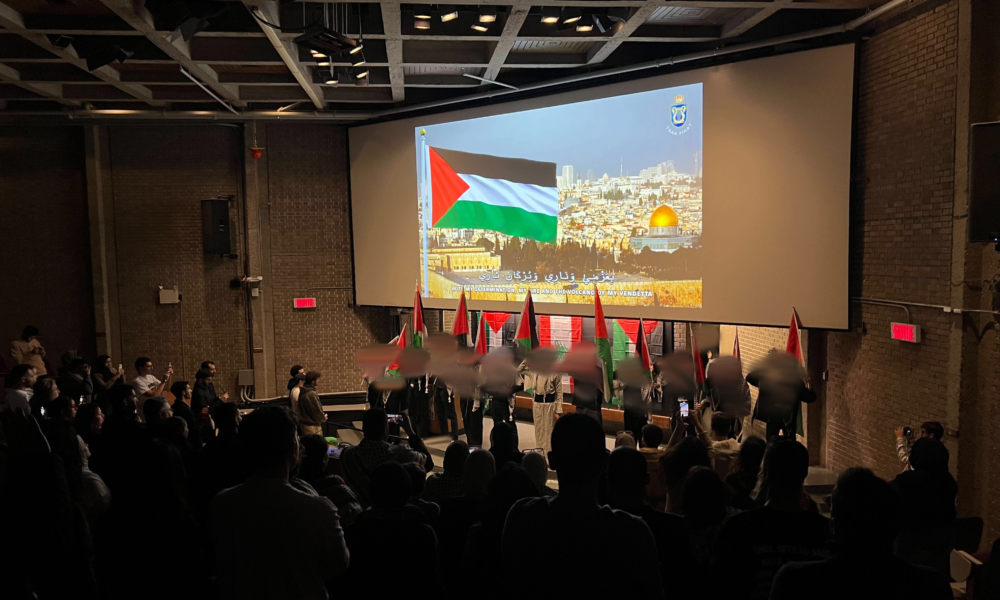“I’m nothing without Palestine. Palestine is my everything, all my values are based on being Palestinian.”
These words, spoken by a member who wished to remain anonymous of the Palestinian Cultural Club (PCC) at McGill, resonated deeply across the university’s campus on Friday, Nov. 8. That evening, the PCC hosted its much-anticipated Palestinian Film Festival, If I Must Die, transforming the Leacock Building into a breathtaking celebration of Palestinian culture.
In a conversation with The Tribune, another PCC organizer who wished to remain anonymous expressed the club’s motivation for organizing the festival.
“A lot of people, especially in Montreal, only knew Palestine after October 7. We want to show people that it did not start on October 7, and it did not start in 1948,” they explained. “Palestine is not all about war.”
The building buzzed with energy as upwards of 300 people gathered to enjoy a carefully curated program of three short films, a full-length feature, and artistic performances highlighting the beauty and resilience of Palestinian culture. An array of Palestinian vendors offering handmade goods lined the halls, while an art exhibit, shown in collaboration with the Palestinian Museum in Palestine, captivated viewers with stunning works by Palestinian artists throughout history. Attendees enveloped themselves in the warmth of traditional thobes and keffiyehs; Palestinian flags proudly hung from the staircases, creating a powerful atmosphere of unity, pride, and remembrance. This event was, in a way, an act of protest against the ongoing injustices in Palestine; as one organizer said, “Art is a form of resistance.”
Once settled into Leacock 132 for the screenings, guests stood for the Palestinian and Lebanese national anthems, followed by a land acknowledgement. The PCC executive team then outlined their organization’s goals, announcing plans to make this film festival an annual tradition. They highlighted recent projects, such as their collaboration with SSMU to offer Dabke classes and their partnership with Concordia’s Palestinian Cultural Club to establish a Palestinian library.
In the beautifully animated short film Checkpoint, British-Palestinian filmmaker Jana Kattan explained the symbolism of the Jaffa orange in a voice-over. Representing strength and resistance, the fruit’s ties to the loss of agricultural land and displacement reflect themes central to the festival.
Before the screening of the 2024 feature film Where Olive Trees Weep, a Palestinian singer performed a musical rendition of the poem If I Must Die by Refaat Alareer. The poignant performance set the tone for the film, evoking a shared sense of dispossession—and resilience—that touched everyone in the audience.
The occasion was more than a simple film festival; it was a tribute to Palestinian identity, a celebration of heritage, and a powerful act of solidarity with those enduring the ongoing struggles of occupation and displacement. Each film and performance served not only as a display of artistry but as a form of resistance, a reclaiming of narratives, and a reminder of the enduring spirit of the Palestinian people. The evening showcased the strength that has defined generations, connecting the audience to a shared history and identity that transcends borders and unites Palestinian communities, from Gaza to the diaspora.
“I want people to know that we exist,” the organizer said. “We exist on campus, we go to class, we are active members in clubs. It’s really hard—exhausting—to prove to everyone that we exist. But we do exist on campus. We have a history, we have a rich heritage, a rich culture.”
As the screenings came to an end, the event’s lasting impact was undeniable. For many, this was not just a demonstration of Palestinian culture, but a call to understand and support the rights and history of a people whose stories are too often overshadowed by violence. The PCC’s selection of moving and relevant films offered a lens into the realities of Palestinian life, stressing that Palestinian identity is more than a reaction to loss—it is a legacy of beauty, fortitude, and an unbreakable connection to the land, traditions, and future of Palestine. Through events like these, the PCC at McGill sends a powerful message: Palestinian culture is alive, vibrant, and will not be erased.









